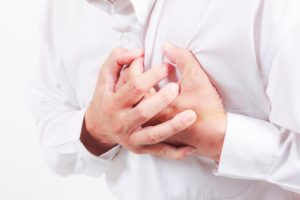 In case you missed it, here is Bel Marra Health’s heart attack update, featuring information on unstable angina, heart attack symptoms in women, and heart failure.
In case you missed it, here is Bel Marra Health’s heart attack update, featuring information on unstable angina, heart attack symptoms in women, and heart failure.
Unstable angina a common cause of heart attack: Causes, symptoms, treatment, and prevention
There are three types of angina: stable, unstable, and variant. This article will focus primarily on unstable angina, which is when plaque in the blood vessels either ruptures or forms a blood clot, suddenly reducing or blocking the blood flow. Unstable angina is not relieved by your common medications—rather, it requires emergency treatment.
Advertisement
The primary symptom of unstable angina is severe chest pain, but pain may also be experienced in the shoulders, neck, back, and arms. Unlike stable angina, the symptoms of unstable angina appear randomly, and pinpointing the source of the pain may be difficult. For example, pain from stable angina arises with vigorous activity or physical strain. In unstable angina, pain and symptoms may appear even while resting. Continue reading…
 Heavy snow linked with heart attack risk
Heavy snow linked with heart attack risk
Heavy snowfalls have been linked to an increase in hospitalizations and deaths due to cardiac events, according to new research published in the Canadian Medical Association Journal.
The increase in heart attacks or myocardial infarctions were seen predominantly in men and are believed to be associated with the need to shovel after a winter storm. Dr. Nathalie Auger of the University of Montreal Hospital Research Centre explained, “Men are potentially more likely than women to shovel, particularly after heavy snowfalls. Snow shoveling is a demanding cardiovascular exercise requiring more than 75 percent of the maximum heart rate, particularly with heavy loads.” Continue reading…
 Heart attack symptoms in women over 50: Facts on women and heart disease
Heart attack symptoms in women over 50: Facts on women and heart disease
February 3, 2017 was National Wear Red Day, an event held by the American Heart Association that raises awareness about the high risk of heart disease among women. Women have nearly double the risk of dying due to a heart attack as men do, and education about the signs and symptoms is necessary in order to help reduce and prevent these potentially fatal events from occurring.
Continue reading to learn about the prevalence of heart disease in women, as well as how to identify common heart attack symptoms and what effect aging has on a women’s heart as she ages. Continue reading…
 Connection found between heart attacks and future heart failure: Study
Connection found between heart attacks and future heart failure: Study
One-quarter of all Americans who have a heart attack go on to experience heart failure, and researchers from the University of Pennsylvania have uncovered a new clue as to why.
Advertisement
After a heart attack, your immune system may elicit a long-term damage response that results in the heart muscle becoming stiff, fibrous, and scar-like. Researchers now contribute this to signaling proteins in the epicardium—a layer of cells that lines the heart and has been found to play a role in moderating this damage response. Previous research has shown that two proteins in the epicardium, YAP and TAZ, encourage the regeneration of the heart muscle. Continue reading…
 Heart failure after a heart attack may be reduced with a Mediterranean-style diet: Study
Heart failure after a heart attack may be reduced with a Mediterranean-style diet: Study
Heart failure after a heart attack may be reduced with Mediterranean-style diet. There have already been numerous studies demonstrating the benefits of the Mediterranean diet, which consists of fruits and vegetables, fish, whole grains, minimal sugar, and a glass of wine.
It’s a known fact that people who experience heart failure after a heart attack should be consuming a heart-healthy diet. Researchers have found the style of eating that helps reduce inflammation after a heart attack. Unhealthy eating, on the other hand, can promote inflammation, causing further damage to the heart. Continue reading…
